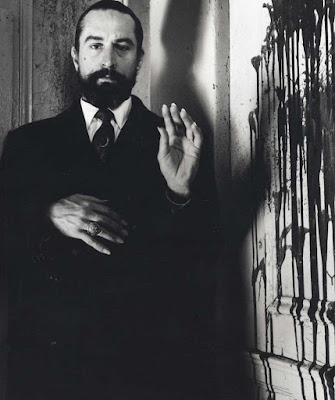The frames above correspond to one of the discarded scenes in Alan Parker’s movie "Angel Heart" (based on William Hjortsberg’s Mephistophelean novel “Falling Angel”), showing the moments after the private detective Harry Angel murders a Vodou-devotee guitarist called Toots Sweet by the method of cutting his genitalia off with a barber's razor, stuffing them in his mouth, and choking him to death. Then, Angel, who in fact has been hired to find the missing Johnny Favorite, another musician, will take his time to redecorate Toots’ apartment writing a word in blood on the wall.
A single word: TELOCA.
What the hell is “TELOCA”?
Initially,
the word does not make sense in any recognized language and, after a search on
the net, no one seems to have interpreted it in connection with the movie.
The first
attempt is to take it as an anagram, as Rosemary did with Hutch's message in
Polanski's movie "Rosemary’s Baby" (when she rearranged the letters discovering, with terror, that they compose the phrase "all-of-them-witches").
Thus
interpreted, "TELOCA" gives us "ALECTO". In Greek mythology,
Alecto (Ἀληκτώ: "the implacable or unceasing anger") is one of the Erinyes,
or Furies, Tisiphone’s sister (the avenger of murder). According to Hesiod, Alecto was the daughter of Gaea fertilized by the blood spilled from Uranus when Cronus castrated him.
In spite of these mysterious echoes, the
meaning is however unsatisfactory, and the answer seems to be in an
ancient biblical book which is not part of the biblical canon as used by
Christians or Jews, apart from Beta Israel: the strange Book of Enoch, which
has driven so many people insane.
Ascribed by tradition to Enoch, the great-grandfather of Noah, actually modern scholars estimate the older sections to date from about 300 BC.
Ascribed by tradition to Enoch, the great-grandfather of Noah, actually modern scholars estimate the older sections to date from about 300 BC.
According
to some Jewish traditions, there was an ancient language prior to the days of
the construction of the Tower of Babel: the language of Paradise. It was used
by God to communicate with angels, and it was spoken also by the angels of
the Apocalypse and the End of Times as well as by Satan and his demons;
“Dark based his conclusions on a reading of the Tower of Babel story as a prophetic work. Drawing heavily on Milton’s interpretation of the fall, he followed his master in placing an inordinate importance on the role of language. But he took the poet’s ideas one step further. If the fall of man also entailed a fall of language, was it not logical to assume that it would be possible to undo the fall, to reverse its effects by undoing the fall of language, by striving to recreate the language that was spoken in Eden? If man could learn to speak this original language of innocence, did it not follow that he would thereby recover a state of innocence within himself?
"We had only to look at the example of Christ, Dark argued, to understand that this was so. For was Christ not a man, a creature of flesh and blood? And did not Christ speak this prelapsarian language? In Milton’s Paradise Regained, Satan speaks with “double-sense deluding,” whereas Christ’s “actions to his words accord, his words / To his large heart give utterance due, his heart / Contains of good, wise, just, the perfect shape.”
"And, because of Christ, did the fall not have a happy outcome, was it not a felix culpa, as doctrine instructs?
"Therefore, Dark contended, it would indeed be possible for man to speak the original language of innocence and to recover, whole and unbroken, the truth within himself. “ —Paul Auster. The New York Trilogy: City of Glass
This sort of "Original Language", which by association with the Book of Enoch came to be called
Enochian, was glossed in 1581 by John Dee, an English mathematician,
astronomer, astrologer, occult philosopher and advisor to Queen Elizabeth I,
and by his friend Edward Kelly, an alchemist with a sinister reputation who lived in Prague during the
Renaissance whom King Rodolfo arrested and imprisoned in the Křivoklát Castle.
Nowadays it is supposed that Enochian is used by some Satanists and practitioners of black
magic, although Anton LaVey did not include it in his Satanic Bible and
discourages its use.
The name
"Edward Kelly" was, by the way, the nom de plume of Aleister Crowley, and amazingly it is also the name used by one of the most ominous characters in "Angel
Heart": the millionaire father of Margaret Krusemark, Ethan Krusemark, who
gets his own daughter into black magic and voodoo and organizes the ceremony in which
Johnny Favorite murders a soldier with a Babylonian dagger —eating his heart. Eventually, the old Krusemark shall be thrown alive into a gigantic pot with Cajun boiling broth by Angel himself.
So, is this
the right way, you Sam Spade?
When
searching for the word "TELOCA" in Enochian, according to (allegedly)
John Dee and Edward Kelly’s writings, we find out:
TELOC =
Death
TELOCA =
Damned
TELOCVOVIM
= Of Him that is Fallen
Below, three
frames of “Angel’s Heart” deleted scenes.
1. Death
scene of Herman Winesap ("Don't worry, Johnny, no one will mourn one less
lawyer in the world.")
2.
Harry's journalist girlfriend is burned alive in some house
3.
Unknown deleted scene in which body of Epiphany Proudfoot is shown burning
"How
terrible is wisdom when it brings no profit to the wise." —Oedipus Rex,
Sophocles































0 comentarios:
Publicar un comentario